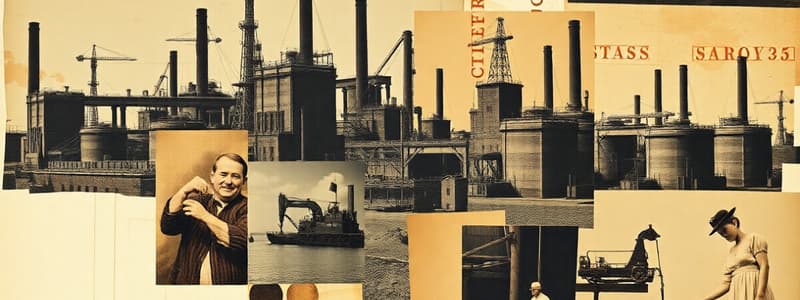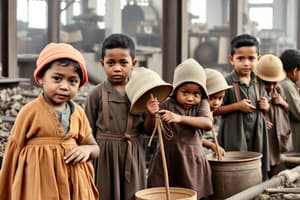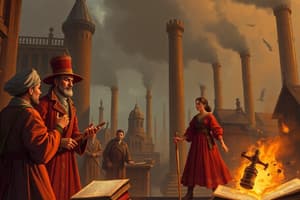Podcast
Questions and Answers
Which of the following best describes the housing situation for the laboring classes in 19th-century industrial cities?
Which of the following best describes the housing situation for the laboring classes in 19th-century industrial cities?
- Spacious, well-planned communities with access to green spaces.
- Unsanitary, overcrowded conditions due to rapid urbanization and lack of regulation. (correct)
- Guaranteed housing provided by factory owners to ensure employee well-being.
- Suburban developments with affordable single-family homes and gardens.
How did the lifestyle of urban factory workers in the 19th century differ from that of village dwellers?
How did the lifestyle of urban factory workers in the 19th century differ from that of village dwellers?
- Village dwellers were isolated and lacked community, which thrived in urban factories.
- Factory workers experienced long hours and rigid schedules, while village dwellers had a more flexible agricultural life. (correct)
- Village dwellers faced constant supervision, unlike the independent factory workers.
- Factory workers enjoyed more flexible work schedules and better access to fresh food.
What was the primary goal of the Ten Hours Act of 1847?
What was the primary goal of the Ten Hours Act of 1847?
- To limit the workday for all workers to ten hours.
- To limit the working hours of women and children to ten hours per day. (correct)
- To provide meal breaks and rest periods during the workday.
- To establish a minimum wage for all factory workers.
What characterized the conditions in workhouses established under the New Poor Law Act?
What characterized the conditions in workhouses established under the New Poor Law Act?
Who was General Ned Ludd, and what did he symbolize?
Who was General Ned Ludd, and what did he symbolize?
How did artisans generally view the rise of mass-produced goods during the Industrial Revolution?
How did artisans generally view the rise of mass-produced goods during the Industrial Revolution?
Which of the following is a core tenet of 19th-century liberalism?
Which of the following is a core tenet of 19th-century liberalism?
What was the central argument in Edmund Burke's Reflections on the Revolution in France?
What was the central argument in Edmund Burke's Reflections on the Revolution in France?
How did 19th-century liberals view the role of commoners (the middle class) in politics?
How did 19th-century liberals view the role of commoners (the middle class) in politics?
What was the main focus of Alexis de Tocqueville's book Democracy in America?
What was the main focus of Alexis de Tocqueville's book Democracy in America?
What was Thomas Paine's view on the legitimacy of government?
What was Thomas Paine's view on the legitimacy of government?
What are the core principles of socialism as it was understood in the 19th century?
What are the core principles of socialism as it was understood in the 19th century?
What was Saint-Simon's vision for an ideal society?
What was Saint-Simon's vision for an ideal society?
What were Charles Fourier's 'phalansteries'?
What were Charles Fourier's 'phalansteries'?
What was Robert Owen's radical idea for social reform?
What was Robert Owen's radical idea for social reform?
What did Louis Blanc advocate for in order to address unemployment?
What did Louis Blanc advocate for in order to address unemployment?
What is 'Volksgeist' in the context of 19th-century nationalism?
What is 'Volksgeist' in the context of 19th-century nationalism?
What role did Metternich play in relation to nationalism in Europe?
What role did Metternich play in relation to nationalism in Europe?
What were the main objectives of the Congress of Vienna (1815)?
What were the main objectives of the Congress of Vienna (1815)?
What was the purpose of the Concert of Europe?
What was the purpose of the Concert of Europe?
Which of the following innovators is associated with the creation of the 'spinning jenny'?
Which of the following innovators is associated with the creation of the 'spinning jenny'?
What factors contributed to England's pioneering role in the Industrial Revolution?
What factors contributed to England's pioneering role in the Industrial Revolution?
Why were early factories often built near water sources?
Why were early factories often built near water sources?
Which city was known as 'Cottonopolis' during the Industrial Revolution?
Which city was known as 'Cottonopolis' during the Industrial Revolution?
What were the major demands of the widespread revolutionary activity in 1848?
What were the major demands of the widespread revolutionary activity in 1848?
In Das Kapital, what concepts did Karl Marx analyze?
In Das Kapital, what concepts did Karl Marx analyze?
What did Karl Marx mean by the phrase 'Religion is the opium of the masses'?
What did Karl Marx mean by the phrase 'Religion is the opium of the masses'?
What are the defining characteristics of communism as an economic system, according to Marx?
What are the defining characteristics of communism as an economic system, according to Marx?
What was the significance of Napoleon's march on Moscow?
What was the significance of Napoleon's march on Moscow?
What were the key principles enshrined in the Code Napoleon (Napoleonic Code)?
What were the key principles enshrined in the Code Napoleon (Napoleonic Code)?
In what ways was Napoleon a product of the French Revolution!
In what ways was Napoleon a product of the French Revolution!
What was the primary goal of Napoleon's foreign policy?
What was the primary goal of Napoleon's foreign policy?
What was the significance of 'The Hundred Days' in 1815?
What was the significance of 'The Hundred Days' in 1815?
How did the treatment of France at the Congress of Vienna influence long-term European stability?
How did the treatment of France at the Congress of Vienna influence long-term European stability?
What impact did the early reliance on water power have on the location of factories, and how did this change over time?
What impact did the early reliance on water power have on the location of factories, and how did this change over time?
Considering the various ideologies of the 19th century, which best reflects the idea of prioritizing communal welfare over individual profit?
Considering the various ideologies of the 19th century, which best reflects the idea of prioritizing communal welfare over individual profit?
How did 19th-century urbanization exacerbate existing social inequalities?
How did 19th-century urbanization exacerbate existing social inequalities?
Flashcards
19th-century cities
19th-century cities
Unplanned, unregulated centers of industry that became overcrowded.
Laboring classes in the 19th century
Laboring classes in the 19th century
Characterized by poor conditions, low pay, child labor and unsanitary living conditions.
Factory workers vs. village dwellers
Factory workers vs. village dwellers
Workers faced long hours and rigid schedules, contrasting with the flexible, agricultural life of village dwellers.
Factory working conditions
Factory working conditions
Signup and view all the flashcards
Ten Hours Act of 1847
Ten Hours Act of 1847
Signup and view all the flashcards
New Poor Law Act and workhouses
New Poor Law Act and workhouses
Signup and view all the flashcards
General Ned Ludd
General Ned Ludd
Signup and view all the flashcards
"Reflections on the Revolution in France"
"Reflections on the Revolution in France"
Signup and view all the flashcards
Liberalism
Liberalism
Signup and view all the flashcards
Liberalism and commoners
Liberalism and commoners
Signup and view all the flashcards
"Democracy in America"
"Democracy in America"
Signup and view all the flashcards
Thomas Paine
Thomas Paine
Signup and view all the flashcards
Socialism
Socialism
Signup and view all the flashcards
Saint-Simon
Saint-Simon
Signup and view all the flashcards
Charles Fourier
Charles Fourier
Signup and view all the flashcards
Robert Owen
Robert Owen
Signup and view all the flashcards
Louis Blanc
Louis Blanc
Signup and view all the flashcards
Nationalism
Nationalism
Signup and view all the flashcards
Metternich and Nationalism
Metternich and Nationalism
Signup and view all the flashcards
Congress of Vienna
Congress of Vienna
Signup and view all the flashcards
Concert of Europe
Concert of Europe
Signup and view all the flashcards
Hargreaves, Arkwright, Crompton, Cartwright
Hargreaves, Arkwright, Crompton, Cartwright
Signup and view all the flashcards
England and Industrial Revolution
England and Industrial Revolution
Signup and view all the flashcards
Factories and water/steam
Factories and water/steam
Signup and view all the flashcards
Cottonopolis (Manchester)
Cottonopolis (Manchester)
Signup and view all the flashcards
The Year of Revolutions - 1848
The Year of Revolutions - 1848
Signup and view all the flashcards
Das Kapital
Das Kapital
Signup and view all the flashcards
"Religion is the Opium of the masses"
"Religion is the Opium of the masses"
Signup and view all the flashcards
Communism
Communism
Signup and view all the flashcards
Napoleon’s March on Moscow
Napoleon’s March on Moscow
Signup and view all the flashcards
Code Napoleon
Code Napoleon
Signup and view all the flashcards
Napoleon, product of revolution
Napoleon, product of revolution
Signup and view all the flashcards
Napoleon’s foreign policy
Napoleon’s foreign policy
Signup and view all the flashcards
The Hundred Days
The Hundred Days
Signup and view all the flashcards
Study Notes
- 19th-century cities were unplanned, unregulated, and overcrowded centers of industry with poor living conditions.
Industrial Revolution Labor
- The laboring classes faced poor working conditions, low wages, child labor, and unsanitary housing.
- Urban factory workers faced long hours, rigid schedules, and poor conditions.
- Village dwellers experienced a more flexible agricultural lifestyle
- Factory working conditions included dangerous machinery, long hours, and widespread child labor.
- The Ten Hours Act in 1847 limited working hours for women and children to ten hours per day.
- The New Poor Law Act established workhouses where the poor received basic needs in exchange for labor, often under harsh conditions.
Sabotage & Artisans
- General Ned Ludd was the mythical leader of the Luddites, who opposed industrialization by destroying machinery.
- Artisans felt threatened by mass-produced goods.
Conservative Thought & Liberalism
- Burke's "Reflections on the Revolution in France" advocated for tradition, gradual change, and opposed radical revolution.
- Liberalism focused on individual liberty, constitutional government, and freedom of the press.
- Liberalism advocated for political rights and participation for the middle class.
Democracy & Socialism
- Alexis de Tocqueville's "Democracy in America" analyzed democracy’s strengths and weaknesses, especially in the United States.
- Thomas Paine believed legitimate government derives from the consent of the governed.
- Socialism advocated for greater equality and co-operative ownership models.
- Saint-Simon proposed a society guided by scientific and industrial leadership.
- Charles Fourier envisioned harmonious, self-sufficient communities.
- Robert Owen believed in the transformative power of education and improved working conditions.
- Louis Blanc advocated for state-supported workshops to guarantee employment.
Nationalism & Reaction
- Nationalism represents belief in a distinct national identity based on language, culture, and history.
- Metternich sought to suppress nationalist movements to maintain conservative order.
- The Congress of Vienna (1815) was established to restore balance of power and prevent revolutionary uprisings.
- France was treated leniently to avoid future conflict.
- The Concert of Europe was an alliance system aimed at preserving conservative order across Europe.
Industrial Revolution Figures
- Hargreaves, Arkwright, Crompton, and Cartwright were innovators of textile manufacturing, inventing the spinning jenny, water frame, spinning mule, and power loom.
- England pioneered industrialization due to resources, political stability, and innovation.
- Early factories were built near water sources; later steam power became dominant.
- Manchester was a major textile production center during the Industrial Revolution.
Revolutions & Ideologies
- 1848 was filled with widespread revolutionary activity demanding national independence, constitutional government, and social reform.
- Karl Marx's "Das Kapital" analyzed exploitation and class struggle.
- Marx viewed religion as a tool of oppression.
- Communism advocates for a classless society, common ownership, and abolition of private property.
Napoleon Bonaparte
- Napoleon's march on Moscow was a disastrous invasion of Russia in 1812, weakening his forces.
- The Napoleonic Code promoted equality before the law and merit-based advancement.
- Napoleon retained revolutionary ideals like meritocracy but also centralized power.
- Napoleon sought to expand French influence through conquest and alliances.
- The Hundred Days in 1815 was Napoleon’s return from exile, ending with his defeat at Waterloo.
Studying That Suits You
Use AI to generate personalized quizzes and flashcards to suit your learning preferences.



